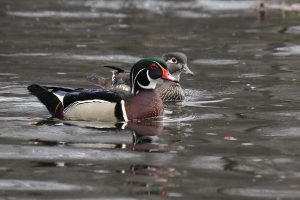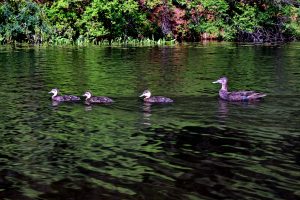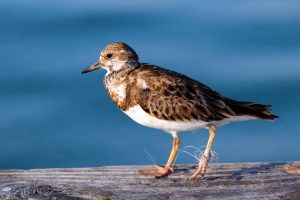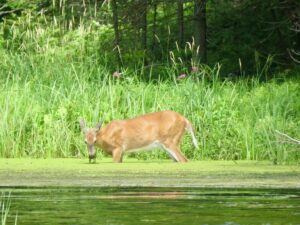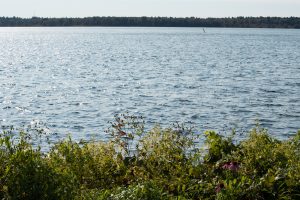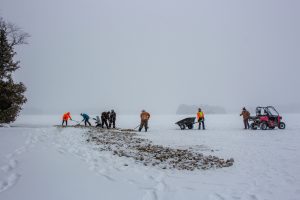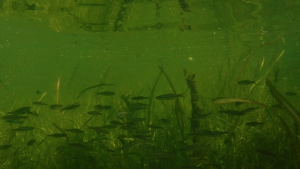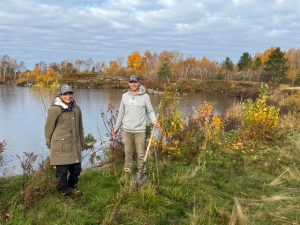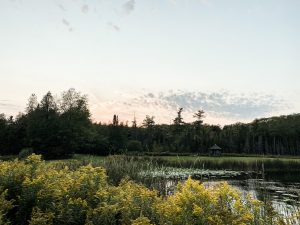by Ty Fischer, Freshwater Health Coordinator Certain environmental actions that we can take have much more profound impacts than we might realize, stretching far beyond the immediate spatial or temporal scale to touch entire communities. Creating a wildflower garden is the perfect example of such an action. With just a few hours of work, almost anyone can create a space that directly supports a special type of insect and animal relied upon by most of the plant kingdom to reproduce: ... Read More
The Way Forward for People and Waterfowl
by Christopher Dennison, Municipal Policy Intern In the previous blog, we discussed the importance of shoreline land-use practices that maintain specific habitat characteristics (namely the planting and maintenance of native vegetation) to support waterbirds. But how can one ensure that the shoreline vegetation chosen will be appropriate for local species? Indeed, the type of shoreline vegetation that is planted and/or maintained on a shoreline plays an important role in habitat selection ... Read More
Waterfowl on the Shore
by Christopher Dennison, Municipal Policy Intern The wellbeing of waterbirds is naturally intertwined with the health of shoreline and riparian ecosystems; the Ribbon of Life that surrounds our freshwater lakes and rivers. In North America, ecologists have posited that the riparian zone (the transitional area of land directly adjacent to a watercourse) supports a much higher diversity of nesting birds than uplands due to specific habitat characteristics (Sanders & Edge, 1998; ... Read More
The Haunting Truth of Ghost Gear and Shoreline Garbage
by Alana Coulombe, Education programs administrator You have finally landed the big catch and then snap! The line breaks. Frustrated, you take a moment to think about what could have been, the photos you could have taken. You think nothing of the interaction except that you need a new line and bob. This interaction is just one of millions that happen across Canada each year. It exemplifies the reality of many environmental issues: collectively, our actions are having a disastrous impact ... Read More
5 Webinars To Introduce You To Freshwater Management
by Paige Jessup, Climate Resilience Intern Our precious freshwater resources are coming under an increasing amount of pressure. Increasing urbanization and agriculture are encroaching on freshwater habitats. With a growing global human population, there is an increased demand for energy and resources meaning more pollution and obstructed water flows. Warming global temperatures are also causing changes in freshwater habitats. Freshwater ecosystems are critical to the future of our ... Read More
Economic Value of Green Infrastructure
by Chantal Lefevre, Natural Edge Regional Coordinator Green infrastructure, which encompasses a range of natural and semi-natural designed features, provides ecological, economic, and social benefits. It has gained increasing attention in recent years as a key strategy for achieving sustainable and climate change resilient environments. In Canada, where natural resources are abundant, green infrastructure has the potential to create significant economic value through various mechanisms, ... Read More
On the Ice Road to Restoration: Reflecting on our recent Walleye Habitat Enhancement Project
by Ty Fischer, Freshwater Health Coordinator, Watersheds Canada Though it covers Canadian lakes like a big frozen shield, the thick winter ice is not a hindrance to the delivery of Watersheds Canada’s Fish Habitat restoration projects – it is an asset. This is especially true for spawning bed enhancement projects, like the one that took place on February 6, 2025. On this day, the Watersheds Canada team met with 16 volunteers from Big Clear Lake Association, Shabot Obaadjiwan First Nation, ... Read More
5 Webinars to Introduce You to Freshwater Fish Conservation
by Paige Jessup, Climate Resilience Intern Freshwater fish are diverse and an important part of our economy. Not only are fish an important food source to people around the world but they are also important to our economies, providing jobs to over 60 million people (Orr, 2021). Fish are also an important part of our freshwater ecosystem; they contribute to the food chain by consuming other aquatic organisms, such as invertebrates and smaller fish, and they are also food for other ... Read More
A Love Your Lake success story: City of Greater Sudbury, Ontario
Article submitted by representatives from Nepahwin Lake Watershed Stewardship Group and Long Lake Stewardship Committee: In our collective desire to enjoy access to our City of Greater Sudbury, Ontario urban lakes, waterfronts have been manicured and hardscaped leading to the decline of lake water quality. Many of our urban lakes are suffering, with increased phosphorus levels, shoreline erosion, and algal blooms. There are simple solutions to harness nature’s ability to restore balance; one ... Read More
4 new resources to help protect our wetlands this World Wetlands Day
by Jonathan Miller, Riparian Habitat Restoration Intern World Wetlands Day (February 2nd) is once again upon us! Wetlands, which include marshes, swamps, fens, bogs, and even lakes, provide a wide variety of essential ecosystem services and functions critical to the planet's well-being. Wetlands most notably improve water quality by filtering excess nutrients or toxins from agriculture, roads, and sewage runoff. Equally remarkable, wetlands act as carbon sinks, storing carbon captured from ... Read More
- « Previous Page
- 1
- 2
- 3
- 4
- 5
- …
- 18
- Next Page »


